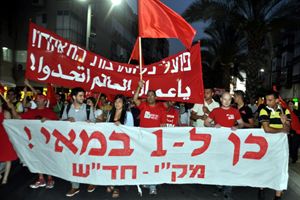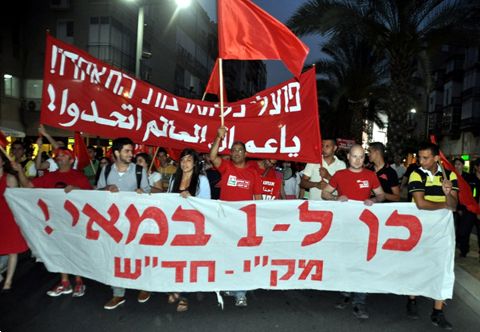
Several roads were close in Tel-Aviv and Haifa on Wednesday due the annual May Day parades. Among the streets blocked off in Tel-Aviv were King Shaul Street, Iben Gabirol, Arlozoroff, Dizengoff, Rothschild Boulevard and King George Avenue.
With talk of early elections and the return of the social justice massive protests this summer, thousands marched through central Tel Aviv on Tuesday to mark International Workers Day. Holding red flags and banners from Hadash, the Communist Party of Israel, the Young Communist League and other left-wing organizations and unions, the demonstrators called out chants that were common during the summer protests, including calls for neo-liberal Prime Minister Binyamin Netanyahu to resign.

May Day poster in Tel-Aviv “Yes – to May Day! , Workers of all nations unite!” (photo: Hadash)
Speaking from a podium at Rabin Square, where the march ended, Hadash MK Dov Khenin spoke of how this year’s May 1 commemorations must signify the return of the summer protests. “The first of May this year must symbolize the beginning of the summer,” he declared. “We must return the spirit of the summer and the social protest.” He added that this summer, as opposed to the last, protests must translate into political change, saying, “If we want social justice, we need a different government.”
Like Khenin, Labor MK and Histadrut labor federation leadership candidate Eitan Cabel used the opportunity to call for change in the Histadrut, which both he and Khenin said had forsaken the interests of workers.
Communist activist Alon-Lee Green said that this year’s May Day march brought together 82 different organizations looking to show that “the struggle isn’t about secular vs. haredi [ultra-Orthodox] or Jews vs. Arabs or Right vs. Left, it’s about everyone together trying to change the entire capitalist system.”
Green, a union organizer, said he didn’t know how it would play out in the upcoming elections, but that “if there is an atmosphere of social and class struggle around the elections, it will be a great accomplishment.” Meanwhile, fascist and former MK Michael Ben-Ari (National Union) and extreme right-wing activist Baruch Marzel led a counter-protest, saying that “these red flags are red because they were soaked in the blood of Jews and gentiles, too, who were murdered through the history of communism.” A few scuffles broke out between the two sides but were quickly broken up, with police making one arrest.
Hundreds demonstrated yesterday also in Haifa and in Mad’jal Krum (Central Galilee) called by Hadash and Communist Party. Next Friday will be another May Day demonstration in Beer-Sheva and in last Saturday thousands participated in the worker’s solidarity march in Nazareth and called for social justice, peace, and equality. Members of the Communist Party of Israel and Hadash activists participated in the rally, among them Knesset members Dov Khenin, Mohammed Barakeh, Hannah Sweid, and Afu Agbaria
On the workers class situation in Israel
While employers’ share of the national income grew in 2012, workers’ share remained the same as it was in 2011, 62 percent, according to a report released. The study was carried out by the Adva Center – which examines Israeli society from the perspectives of equality and social justice – and was released to coincide with May Day. The report shows that while their share remained stagnant in 2012 and was significantly lower than it was 10 years ago – 67% – workers did benefit from job growth and the continuing decline of unemployment, which stood at only 6.9% last year.
According to the study, employees should have earned, on average, an additional NIS 10,924 in 2012, which is equivalent to NIS 910 per month. Between 2002 and 2012, national income grew by 46%, workers’ income increased by 35% and employers’ income grew by 160%. During that decade, the median salary per employee did not exceed 63% of the average salary per employee.
The data also showed that employers’ participation in funding social benefits for their employees is lower than in most developed capitalist countries. The study also revealed that in 2011, 25.8% of employees in Israel received a salary defined by the OECD as low. The country’s lowest earners include 34.7% of Israeli women, 34.3% of the Arab-Palestinian living in Israel, 34% of people who lack a high school diploma and 26.8% of the country’s immigrants from the former Soviet Union.


